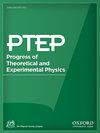具有质子-中子配对波动的发电机坐标法和 N = Z 奇多核的磁特性
IF 8.3
4区 物理与天体物理
Q1 Physics and Astronomy
引用次数: 0
摘要
配对相关性在各种核现象中发挥着重要作用。然而,对质子-中子(pn)配对,尤其是等标pn配对(S = 1,T = 0)的定量理解仍然是个未知数。为了澄清 pn 配对的特性,我们研究了 pn 配对在 N = Z 奇多核的 M1 转变中的作用。我们建立了一个基于生成器坐标法(GCM)的理论模型,其中使用等视角和等矢量 pn 对振幅作为生成器坐标。利用粒子和角动量投影,pn 对 GCM 很好地再现了可精确求解的 SO(8) 模型中奇-偶核的 M1 转变。我们将该方法应用于 N = Z 奇-多原子核,发现 B(M1)的实验值得到了很好的再现。我们还研究了 B(M1)对等离子配对相互作用强度的敏感性。本文章由计算机程序翻译,如有差异,请以英文原文为准。
Generator coordinate method with proton–neutron pairing fluctuations and magnetic properties of N = Z odd–odd nuclei
Pairing correlations play an important role in a variety of nuclear phenomena. However, a quantitative understanding of proton–neutron (pn) pairing, especially isoscalar pn pairing (S = 1, T = 0) remains elusive. To clarify the property of pn pairing, we investigate the roles of pn pairing in the M1 transition of N = Z odd–odd nuclei. We develop a theoretical model based on the generator coordinate method (GCM) in which the isoscalar and isovector pn-pair amplitudes are used as the generator coordinates. Using the particle and the angular-momentum projections, the pn-pair GCM well reproduces the M1 transition of odd–odd nuclei for the exactly solvable SO(8) model. We apply the method to N = Z odd–odd nuclei and find that the experimental values of B(M1) are well reproduced. We also study the sensitivity of B(M1) to the strength of the isoscalar pairing interaction.
求助全文
通过发布文献求助,成功后即可免费获取论文全文。
去求助
来源期刊

Progress of Theoretical and Experimental Physics
PHYSICS, MULTIDISCIPLINARY-PHYSICS, PARTICLES & FIELDS
CiteScore
12.00
自引率
5.70%
发文量
148
审稿时长
17 weeks
期刊介绍:
Progress of Theoretical and Experimental Physics (PTEP) is an international journal that publishes articles on theoretical and experimental physics. PTEP is a fully open access, online-only journal published by the Physical Society of Japan.
PTEP is the successor to Progress of Theoretical Physics (PTP), which terminated in December 2012 and merged into PTEP in January 2013.
PTP was founded in 1946 by Hideki Yukawa, the first Japanese Nobel Laureate. PTEP, the successor journal to PTP, has a broader scope than that of PTP covering both theoretical and experimental physics.
PTEP mainly covers areas including particles and fields, nuclear physics, astrophysics and cosmology, beam physics and instrumentation, and general and mathematical physics.
 求助内容:
求助内容: 应助结果提醒方式:
应助结果提醒方式:


